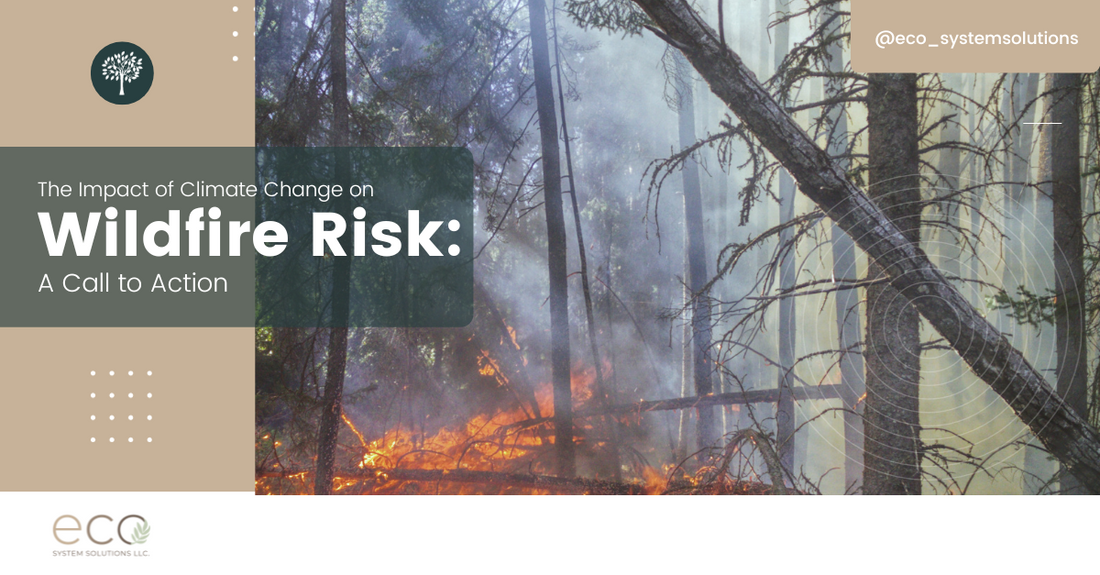Introduction
In the seemingly eternal dance between humanity and nature, the rhythm has shifted. Across the globe, wildfires are no longer sporadic, contained events; they have become a persistent threat, leaving communities in perpetual fear. As we grapple with this evolving menace, it's imperative to recognize the instrumental role that climate change plays in intensifying wildfire risks. This blog explores the intricate connection between climate change and wildfires, delving into recent trends, the ecological toll, and the urgent need for collective action.
Understanding the Climate-Wildfire Connection
Climate change has emerged as the unseen hand behind the rise in catastrophic wildfires. The intricate connection lies in the alteration of climate patterns, resulting in prolonged periods of heat, shifting precipitation patterns, and the exacerbation of drought conditions. The interplay of these factors creates environments ripe for wildfires to ignite, spread, and devastate landscapes.
Recent Trends and Statistics
The statistics are sobering. In the last decade, we've witnessed an alarming surge in the frequency and intensity of wildfires. From the vast forests of North America to the bushlands of Australia, no region is immune to the impacts of a changing climate. The western United States, for instance, has borne the brunt, experiencing a twofold increase in the annual burned area due to wildfires since the 1980s.
The Role of Drought in Wildfire Occurrence
Central to this crisis is the prolonged drought facilitated by shifting climate patterns. As precipitation becomes more erratic, prolonged dry spells create tinder-like conditions in forests and grasslands. The resultant parched landscapes serve as kindling, waiting for a spark to set off a devastating wildfire.
Vulnerable Ecosystems and Biodiversity Loss
The toll on ecosystems is severe. Wildlife, already facing habitat loss and fragmentation, confronts a new threat. The ecological consequences of wildfires include the destruction of habitats, the loss of biodiversity, and long-term shifts in ecosystem dynamics. It's not merely the trees that burn; it's the intricate tapestry of life that unravels.
Human and Economic Impact
The impact on communities is both immediate and enduring. Beyond the stark images of charred landscapes lies the human toll — lives lost, homes destroyed, and communities displaced. The economic repercussions reverberate, with the cost of firefighting, property damage, and healthcare burdening local and national economies.
Challenges in Fire Management
Firefighting efforts are strained, pushed to their limits by the increasing ferocity and frequency of wildfires. The challenge is multifaceted — from resource scarcity to the sheer scale of the incidents. Urgent solutions are required to bolster firefighting capabilities and enhance our preparedness.
International Collaborations in Wildfire Management
Addressing wildfires requires a collaborative approach that transcends borders. International collaborations offer hope and practical solutions. Shared resources, knowledge exchange, and coordinated efforts have proven effective in mitigating the impact of wildfires.
A Call to Action: Individual and Community Responsibility
While international collaboration is crucial, the responsibility is not solely on governments and institutions. Every individual and community plays a vital role. Simple actions, from creating defensible spaces around homes to promoting community-wide fire safety education, can significantly contribute to reducing wildfire risks.
Policy Recommendations for Governments and Institutions
Governments and institutions must lead the charge against climate change and its associated impacts. Robust policies that address the root causes of wildfires, coupled with investments in sustainable land management and firefighting infrastructure, are critical to safeguarding communities.
Investing in Research and Technology
Innovation is our ally in this battle. Research and technology are powerful tools that can reshape our approach to wildfire prevention and management. Advances in fire-resistant materials, early warning systems, and predictive modeling offer glimpses into a future where we are better equipped to navigate this evolving challenge.
In-Demand Green Jobs
As we confront the reality of escalating wildfires, the demand for skilled professionals in firefighting, disaster management, and ecological restoration is on the rise. These careers are not only crucial for immediate response but also for building resilient communities that can withstand and recover from the impacts of wildfires.
Success Stories
Amid the challenges, stories of resilience and success emerge. Individuals and communities have pioneered innovative approaches to wildfire prevention and recovery. By learning from these success stories, we glean insights into what works and how we can replicate these efforts on a broader scale.
Challenges and Opportunities
Acknowledging the challenges is the first step towards overcoming them. From climate skepticism to resource constraints, we confront obstacles that demand collective determination. Yet, within these challenges lie opportunities — to build stronger communities, to develop sustainable land management practices, and to pioneer new technologies that redefine our relationship with fire.
Conclusion
In confronting the impact of climate change on wildfire risk, the urgency of our collective response cannot be overstated. It's a call to action that spans individuals, communities, governments, and institutions. By addressing the root causes, fostering innovation, and embracing a shared responsibility, we can navigate this fiery challenge and build a future where landscapes are resilient, and communities thrive.

